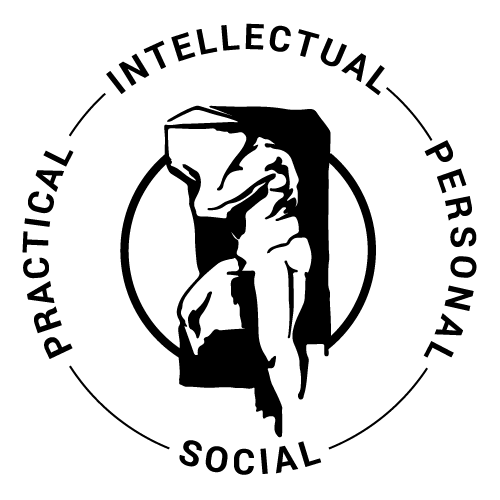The Classics, or Great Books—weren’t they the dreck of dead white males? In the past few years, many have discovered otherwise and now there’s astonishing growth in the programs using these books as their basic texts. Apparently, many have discovered what Goethe said two centuries ago:
“Ignorant men raise questions that wise men answered a thousand years ago.”
WHY THE GREAT BOOKS ARE IMPORTANT
The Wikipedia entry for “Great Books” claims they’re what authorities or convention deem the most important; but I think Mortimer Adler’s reasons are far more essential:
- “[T]he book has contemporary significance; that is, it has relevance to the problems and issues of our times.”
- “[T]he book is inexhaustible; it can be read again and again with benefit; This is an exacting criterion, an ideal that is fully attained by only a small number of the 511 works that we selected. It is approximated in varying degrees by the rest.”[3]
- “[T]he book is relevant to a large number of the great ideas and great issues that have occupied the minds of thinking individuals for the last 25 centuries.”
What’s been rediscovered is especially the last criterion: these books well examine the perennial issues of human beings and their civilizations.
And what many have realized is: without knowledge from these books, they’re left ignorant and bereft about the world around them, which has been shaped by the ideas in the books.
Before the 20th century, these were the books in print, these were the books that the most successful people studied.
Shakespeare, Newton, the American Founders—all were well-versed in the Classics. Shakespeare based a number of his plays on ancient ones. And the aesthetic theory of the Renaissance took its lead from Aristotle’s Poetics, which informs writers to this day, especially screenwriters because of their emphasis on plot.
So, fortunately, more and more are cottoning on to the crucial importance of The Great Books—something we at The Great Connections have touted for years.
NEW PROGRAMS FOR THE GREAT BOOKS
Here are are some interesting developments:
As a counter-measure to the post-modernist hegemony on campus, Arizona legislators are “fostering academic programs directly from the state budget and sidestepping the usual arrangement in which universities decide how to spend the money. … Their goal is to promote the study of Western civilization, once a core requirement at many colleges, contending that a well-educated society must understand its roots—the Delphic maxim ‘know thyself.'”
“The new courses at Arizona State focus on Western thinking from the ancient Greeks to the Founding Fathers and beyond, with an emphasis on free-market philosophy. They draw heavily from original texts rather than modern interpretations.”
Another development: online courses for the lay-person to study the classics, such as Intellectual Linear Progression and The Great Discourses.
“Intellectual Linear Progression allows us to learn as our civilization learned, by reading the key texts completely and in order, so our fund of knowledge grows, just as it did in the West.
“We take the ideas of ancient Greece, follow them through their evolution in Rome, the middle ages, the enlightenment, right up to our own time. We read the best, men like Plato, Aristotle, Locke, Kant, Wittgenstein, et al., and allow them to teach us.”
Adam Rose and others behind the Great Discourses “believe that ‘better thinking’ is a necessary element of ‘better living’, and therefore that everyone needs—and deserves —access to appealing, lifelong liberal educational activities specifically designed to help them flourish as human beings living personal, professional and civic lives of the highest-possible quality.”
WHERE TO FIND A GREAT BOOKS PROGRAM
Of course, The Great Books have been used in an unusual set of college programs since the ’30’s. Here’s a list selected by Best College Reviews. I’m not sure I agree with their rankings of the schools, but it’s a good resource. You’ll note that a large number are Catholic institutions, a legacy of Aquinas’ influence and Cardinal John Newman’s influential writing on The Idea of the University, in which he advocates for a rigorous liberal arts education (not to be confused with the mostly-elective meanderings which pass as liberal arts at many schools today).
My own daughter got a marvelously rich, classical education at St. John’s College in Annapolis. This was the first program to systematically implement the Great Books idea after its development by Robert Hutchins’ committee at the University of Chicago. Chicago, a hotbed of great books programs!
Caveat Emptor, however, because some schools like Shimer College teach the Great Books through a very slanted, modern lens (as I discovered when I taught there in 2009). Here’s another list from Temple University.
Great Books Academy charter schools claim to have a classic program; again, if you’re interested, inform yourself as to what such a program should look like and then actually observe one at a school.
There’s a large interest among homeschoolers in classical education. Here’s an online source for high school Great Books study, The Great Books Discussions.
Also growing are special programs at traditional universities, such as The Clemson Institute for the Study of Capitalism and The James Madison Program.
So! The vibrant market in education in the U.S. may save us yet.



